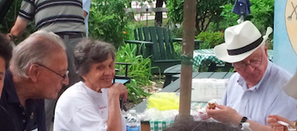 Geof Kerr, Marjorie Marcallino, and Ali Schwayri at a garden community potluck in 2014.
Geof Kerr, Marjorie Marcallino, and Ali Schwayri at a garden community potluck in 2014. To garden is to have hope, they say. Looking out over the riot of colors, textures and plantings that is the Roosevelt Island Garden Club, it is hard to remember the cold, hard earth of winter from which it all sprang. As it does every year, witnessed by Islanders and visitors of all ages, from the connoisseurs of roses to children absorbed by slugs and snails and the first carrots to sprout from mud.
Presiding over all this is Ali Schwayri, longtime and indefatigable president of the Club, whose familiar presence owes something to both the Wizard of Oz and a five-star general. But hope is the main ingredient, disguised though it is by a respect for the rules that may make order out of chaos. "You will be growing them in your garden," he told a neophyte who arrived at a Club potluck years ago bearing supermarket boxes of beloved Concord grapes.
None of this should be surprising given Ali's past. He developed an intense love of nature as a child growing up on a brightly painted tobacco farm in northeast Lebanon to which he returns annually, with a distant view of cedars and the Mediterranean.
He came to New York in 1969 to finish his training in pulmonary medicine at New York University and Bellevue Hospital. He went on to work at Con Edison, where he became the company physician, retiring in 2000. Ali moved to Roosevelt Island in February, 1977.
It was a natural for Ali, a then-green and leafy sliver of countryside in the heart of the city. He soon became president of the Garden Club, a position he has held three times, serving for 11 years. He helped to create the first garden in the late 1970's in a small patch of land where Manhattan Park stands now across from Gristedes, created with Ann Hallowell, Nancy Cruickshank, Martha Kraut, Marjorie Marcallino and other committed gardeners like Henry and Ericka Tamao. Ali and Vinny Russo, a friend and an even more avid gardener, burrowed into the heart of tangled undergrowth and bushes opposite the Post Office to create a magical clearing, invisible from the street.
Teasingly nicknamed Schwayri Park by those in the know, the clearing was a simple matter of a few log seats and sky. It was the best of secrets, of serendipity, reminding someone who discovered it accidentally of the poet Wallace Stevens' notion of "out of nothing to have come on major weather."
The Club's next site was as magical a place, sprawling out over the land that now covers the subway station, and in 1988 won the "Dress up your Neighborhood Award" from Citizens Committee NYC. Workers clearing the land years after the garden's closing were surprised to come across watermelons and strawberries growing wild there. Old trees fringed the east end of the site, their branches stirring mysteriously at dusk. Everyone seemed to know everyone else, with old-hands offering gentle advice to new gardeners.
A small tumbledown shed was a kind of ad hoc clubhouse, packed with the old-hands smoking and gossiping their way cheerily through sudden thunderstorms.
Nine years later the Club was evicted as the subway was developed. Volunteers formed a chain to pass all the garden accoutrements north up Main Street, with a fleet of cars transporting the larger things. Petitioned for a new space, RIOC provided about an acre of land in Octagon Park. Designed by John Dodge and built by John Richards and a core of longtime, experienced gardeners, the new space was laid out like the spokes in a wheel and opened in 1992.
Sounding a little sad, Ali talks of how the Club has grown and of necessity became a more formal institution, working more closely with RIOC, with new regulations replacing the old laissez-faire spirit of gardening. But it is still a place where everyone "can grow everything they want," he said. He himself has grown tomatoes, string beans, cucumbers, Swiss chard, peas, varieties of lettuce and okra, as well as herbs for cooking and a fig tree. There is a great satisfaction in growing one's own food, he finds.
Among the flowers he plants are prized foxgloves, begonias, impatiens, hostas, Dusty Miller, petunias, Black-Eyed Susans, and salvia. "All annuals," Ali said. "Annuals give you color and they're not difficult to grow."
Ali has also served as president of the Roosevelt Island Tree Board since 1985, fighting hard though sometimes unsuccessfully to save the Island's old trees from the savage depredations of construction. The Tree Board has invited park rangers and given tours of Island trees. Ali also oversees the planting of new trees, some of them memorials, though space is harder to come by these days. And in 2015, Ali and the Tree Board are responsible for the placing of small identifying plaques on trees throughout the Island.
But it is clear his heart is with the gardens. He is not out to save the planet, but the Roosevelt Island gardens are a start. "It's the pleasure of working with nature, with plants and soil, of meeting friends and neighbors and making new friends," he says contemplatively. "Developing a sense of community. For me, that's what it is about."
 RSS Feed
RSS Feed
